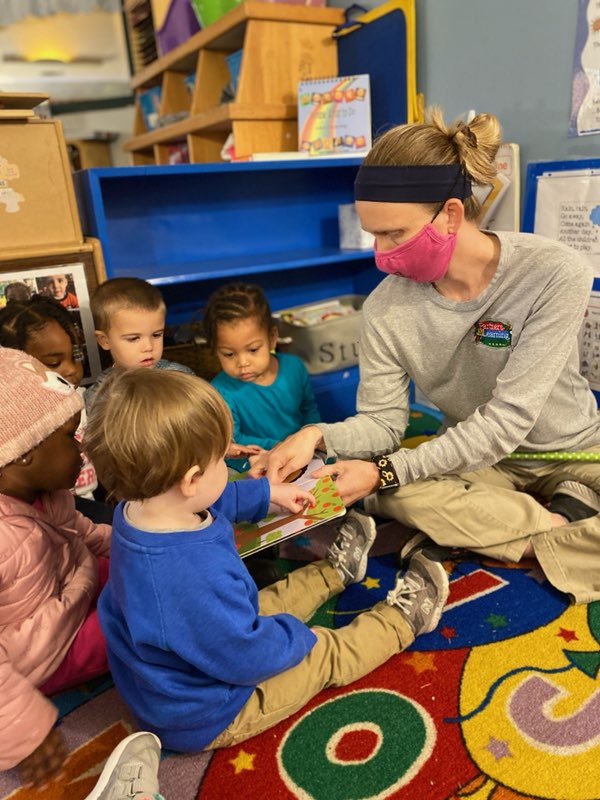
Early Childhood Teachers
- Early Childhood Educator I, II, III6
- Lead Teacher, Teacher4;
- Teacher, Assistant Teacher7,8
| Job Overview: Within any center-based setting, teachers may hold a variety of positions. Beginning teachers are often called Assistant Teachers or Teaching Assistants, and work under the supervision of a more educated, experienced teacher. In larger programs, teachers with more education and experience may earn the title of Lead Teacher. This position entails more planning and supervision of other teachers, as well as center administrative responsibility.3 Teachers are responsible for planning and implementing learning experiences that advance the intellectual and physical development of children including: improving their readiness for school by developing their literacy skills, vocabulary, appreciation of books and increased problem-solving skills while maintaining a safe, healthy environment.8 |
Places of Possible Employment: For-Profit, Non-profit and Public Early Care and Education Centers and Birth to Age 8 (Public school Pk – 3rd, Head Start, Early Head Start, University Settings, For Profit Child Care Centers, Nonprofit Child Care Centers) Family Child Care Homes, In-Home Settings (Nanny), Children’s Museums as Education Coordinators |
Minimum Requirements and Education: Lead Teacher or Early Childhood Educator II and III
|
Salary Range: $26,660 – $54,780 per year |
Recommended Previous Experience: Camp counselor, informal or formal after-school provider, non-profit or church child care during services or events, gymnastics or dance instructor for young children, babysitting, volunteer in an early care and education setting, volunteer in children’s services in a library, staff in a children’s museum |
Professional Standards: The NAEYC’s Professional Standards and Competencies (listed below) and the NAEYC Code of Ethics are specific to the job of the Early Childhood Teacher.
|
Additional Resources: Great Early Childhood Teacher Brochure |
3 Child Care Services Association. (2018). Careers in early childhood a North Carolina directory, fifth edition. Retrieved from https://www.childcareservices.org/wp-content/uploads/2019/05/NC-ECE-Career-Directory_051419.pdf
4 Division of Child Development and Early Education. (N.d.). North Carolina Minimum Requirements for Teachers. Retrieved from https://uncw4.sharepoint.com/teams/NCICDP/Shared%20Documents/General/Career%20Project%20Resources/Minimum%20education%20in%20NC-%20FCC,%20Lead%20Teacher,%20Teacher,%20SA%20Group%20Leader,%20SA%20Program%20Coordinator.pdf
5 Power to the Profession. (2020). Professional standards and competencies for early childhood educators. Retrieved from https://www.naeyc.org/sites/default/files/globally-shared/downloads/PDFs/resources/position-statements/professional_standards_and_competencies_for_early_childhood_educators.pdf
6 Power to the Profession. (2020). Unifying framework for the early childhood education profession. Retrieved from http://powertotheprofession.org/wp-content/uploads/2020/03/Power-to-Profession-Framework-03312020-web.pdf
7 National Center for Early Childhood Development, Teaching and Learning. (2018). Education requirements for center-based assistant teachers. Staff qualifications: Steps for programs to consider. https://eclkc.ohs.acf.hhs.gov/sites/default/files/pdf/no-search/ed-reqs-preschool-assistant-teachers.pdf
8 National Center for Early Childhood Development, Teaching and Learning. (2018). Education requirements for center-based preschool teachers. Staff qualifications: Steps for programs to consider. Retrieved from https://eclkc.ohs.acf.hhs.gov/sites/default/files/pdf/no-search/ed-reqs-preschool-teachers.pdf
9 National Center on Early Childhood Development, Teaching and Learning. (2018). Education requirements for coaches. Staff qualifications: Steps for programs to consider. Retrieved from https://eclkc.ohs.acf.hhs.gov/sites/default/files/pdf/no-search/ed-reqs-coaches.pdf
10National Center on Early Childhood Quality Assurance. (2017). Designing family-friendly consumer education on child care. Retrieved from https://childcareta.acf.hhs.gov/sites/default/files/public/designing_family_friendly_consumer_education_on_child_care.pdf
11 North Carolina Institute for Child Development Professionals. (2017). NC early care and education professional certification scale. Retrieved from https://ncicdp.org/documents/EEC_ECE_Scale.pdf



